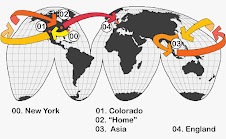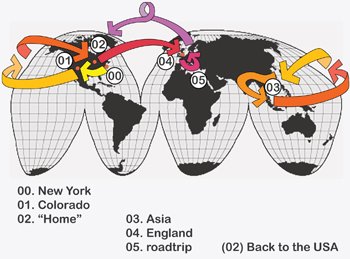So there were the little snowballs that fell the other morning and the milk bottles delivered to our door, the giant paper clips and the deciphering of double versus single cream... but here is one more Unexpected England thing: gypsies.
About a month ago, I was carefully inspecting an aerial photograph of a large master plan site I am working on digitally modeling at work when I spotted an area that I couldn't figure out. It looked like a parking lot but full of large items. Maybe a lumber yard? A market? Or a... ummm... what is that? I asked a coworker, and he said it was an established travelers' site. It's even officially listed as such on the city council planning proposals map. Travelers! Gypsies! Those still exist? Perhaps this is culturally insensitive of me, but I thought that most gypsies/travelers had settled down permanently or lived in Romania. Is "gypsies" even a PC term? These are things that Americans just don't tend to know.
A week after that, Josh walked to a nearby village to collect some lamps we'd found through the ever-amazing Free-cycle website and encountered a grassy area surrounded by boulders. The friendly lamp-giver told him that was a popular Traveler site. The boulders were to prevent driving onto the lawn because once settled it was legally difficult to remove the travelers.
Like that milk bottles post a few months ago, who knew??
Monday, January 14, 2008
Wanderers
Posted by
megfeen
at
9:20 PM
![]()
Subscribe to:
Post Comments (Atom)


8 comments:
I actually found this info out last year. Elam's class size at school fluctuated several times...I was thinking maybe due to the university and international students heading home but I found out through some moms that it's because of the gypsy population.
That's so strange.
I would think that would be frustrating for a teacher, but I guess some days at multiple schools are better than no days at any school...
Like you, I'd never given much thought to them before living in Europe. But while I was living in the Czech Republic and Hungary, I found out that the more "PC" way to refer to them is "Roma." There is a Wikipedia article about them with the title "Romani people."
Thanks for the info! Funny how in this day and age you can guess that the terms you learned growing up for almost any minority group are probably not considered the correct ones anymore. I was just taking a stab in the dark about "gypsies", but it somehow seemed like a stab in the right direction...
Yes, I can confirm that "gypsies" is most definitely NOT a PC term... try "travellers".
You weren't to know though so I'm sure any travellers reading this won't take offence ;-)
We had a similar eye-opening on our trip to G.B.. In the canals in Oxford there were very ornate Gypsy boats (perhaps they have a more PC name, but that is the name we were given for them). It seemed like a cool life, docked to the side of a canal in Oxford near the ruins of an abby. When its time to move on, you motor to the next town passing through a lock or two, staffed by an officer who stands in his little lock-box waiting for you to come.
In Cornwall, we took a shortcut that was only marked on some of our maps. We weren't quite sure we were in the right place because the road disappeared into a slightly improved trail that went down steeply. We spotted a couple who were outside a few parked trailers, playing ping-pong on a table set up between the trailers. They looked at our maps and said we were in the right place, but they corrected the road name: we were on the 'Gypsy Road' and not whatever our map said.
Gypsy, who is this woman you have shrunk?
Foreget PC non Pc, These are terms of abuse by some people. What is usually non PC is a term of abuse. The term Gypsy is perfectly acceptable. Note the capital G. They are a race of people normally called Romany. Still travel in many countries and can be seen all over the world.
Travellers in the UK and possibly America usually refers to Irish Travellers, Another race of people from Ireland with their own language, Shelta, although like the Gypsy language Romany, is not in every day use.
Post a Comment